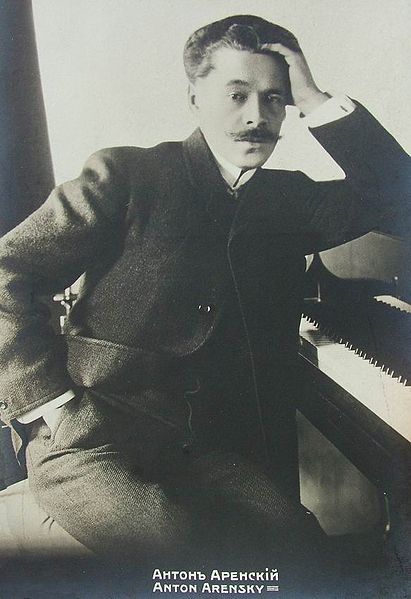<Back to Index>
- Physicist Paul Karl Ludwig Drude, 1863
- Composer Anton Stepanovich Arensky, 1861
- Tsar of All Russia Mikhail I Fyodorovich Romanov, 1596
PAGE SPONSOR

Anton Stepanovich Arensky (Russian: Анто́н Степа́нович Аре́нский; (12 July [O.S. 30 June] 1861 – 25 February [O.S. 12 February] 1906), was a Russian composer of Romantic classical music, a pianist and a professor of music.
Arensky was born in Novgorod, Russia. He was musically precocious and had composed a number of songs and piano pieces by the age of nine. With his mother and father, he moved to Saint Petersburg in 1879, where he studied composition at the Saint Petersburg Conservatory with Nikolai Rimsky - Korsakov.
After graduating from the Saint Petersburg Conservatory in 1882, Arensky became a professor at the Moscow Conservatory. Among his students there were Alexander Scriabin, Sergei Rachmaninoff and Alexander Gretchaninov.
In 1895 Arensky returned to Saint Petersburg as the director of the Imperial Choir, a post for which he had been recommended by Mily Balakirev. Arensky retired from this position in 1901, spending his remaining time as a pianist, conductor, and composer.
Arensky died of tuberculosis in a sanatorium in Perkjärvi, Finland. It is alleged that drinking and gambling undermined his health. The Antarctic Arensky Glacier was named after him. Pyotr Ilyich Tchaikovsky was the greatest influence on Arensky's musical compositions. Indeed, Rimsky - Korsakov said,
"In his youth Arensky did not escape some influence from me; later the
influence came from Tchaikovsky. He will quickly be forgotten." The
perception that he lacked a distinctive personal style contributed to
long term neglect of his music, though in recent years a large number
of his compositions have been recorded. Especially popular are the Variations on a Theme of Tchaikovsky for string orchestra, Op. 35a, based on one of Tchaikovsky's Songs for Children, Op. 54. Arensky was perhaps at his best in chamber music, in which he wrote two string quartets, two piano trios, and a piano quintet.